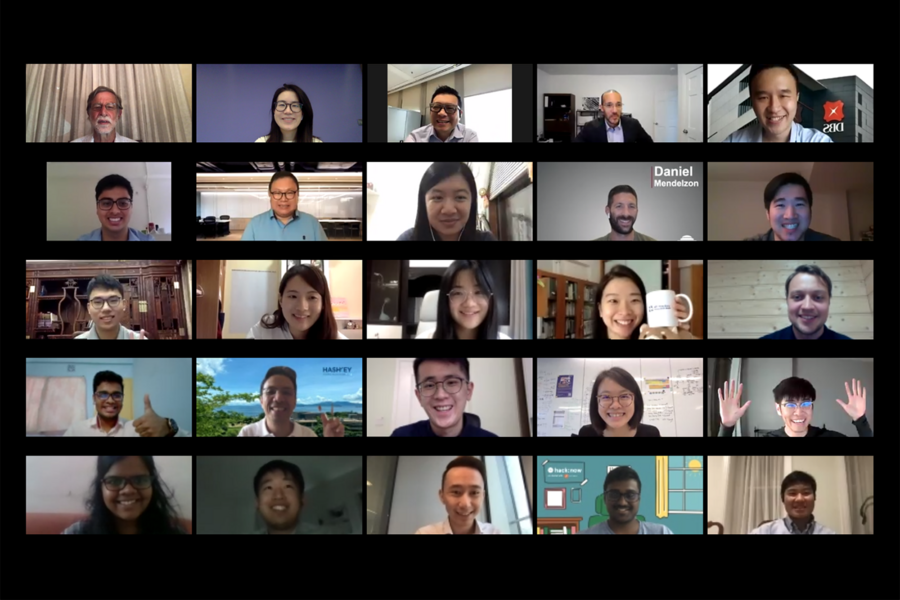MIT students collaborate online with Hong Kong peers and industry partners to build fintech solutions.
MIT Hong Kong Innovation Node
This year marked the third time that MIT Hong Kong Innovation Node hosted a fintech entrepreneurship program designed for students from MIT and from Hong Kong, but this summer marked the first time the experience was hosted online. Called MIT Entrepreneurship and Fintech Integrator (MEFTI), 33 students participated remotely across five different time zones due to Covid-19.
“Doing this virtually is a challenge for everyone, and we’re proud that our students made it through the nine days,” says Professor Charles Sodini, the Clarence J. LeBel Professor in Electrical Engineering and faculty director of the Innovation Node.
The program retooled to make it work in a virtual world, using a flipped classroom model where students watch select lectures or videos ahead of time. That allowed shorter synchronous sessions on Zoom to ease out of an already demanding schedule.
What’s unique about MEFTI is the involvement of industry partners who help students connect theory into practice. This critical element was retained as the program moved online. DBS Bank, Hashkey Digital Asset Group, and the Hong Kong Monetary Authority worked closely with MIT Node to design challenge statements, vital in the process of action learning to tackle complex problems.
Sodini says of the industry partners, “They did a terrific job on this — the challenges were broad and not too specific, which allows latitude for student creativity, and have real-world relevance to their businesses.”
During the program, students learn select design abilities and the entrepreneurial mindset. They then practice applying them in the real-world context of the financial services industry. Using digital tools for team communication and visual collaboration, students work with peers from diverse disciplines to understand pressing issues in wealth management, insurance, and trade finance. This requires a deep dive into the challenge areas — navigating ambiguity and projecting empathy to the customer problem, central to the educational process.
Accelerating the learning curve
As a team coach for the program, Kenny Li MBA ’20 says, “The industry prompts put teams through a rigorous challenge; my team had to learn about blockchain, trade finance, and build an entire solution within nine days.” A former teaching assistant for Blockchain Lab at MIT Sloan School of Management, Li put his domain knowledge to immediate use, offering a blockchain crash course over Zoom for his team and others wanting to learn more about the fundamentals.
With an anchor to industry, “MEFTI was able to provide fast access through its network to experts,” says Li. “This really made a difference in the team’s ability to learn quickly.” Despite being scattered across various time zones, the students were able to coordinate and create a viable solution, says Li.
Leveraging online connectivity allowed the Innovation Node to expand mentorship opportunities with fintech experts from Hong Kong, London, and the United States. This high-touch model helped diffuse some of the challenges of remote collaboration and unpack learning.
“We were able to connect with bankers, blockchain professionals, and legal professionals all over the world,” says MBA student Erica Yang.
“Industry partners clarified a lot of our questions, provided us with valuable and helpful advice, and also gave us a clear direction to work on,” says Yang. The nudge and validation from these stakeholders helped students understand customer insights. “They taught us a lot of things that we probably wouldn’t be able to figure out on our own,” she adds.
The program culminated in a showcase where six teams pitched their solutions in the form of business plans and wireframes. These were presented live over Zoom to a panel of judges, and included: an on-premises software-as-a-service solution for insurance companies to improve the medical claims process; a virtual selling platform using robo-advisors to help mainland Chinese investors access cross-border Hong Kong investment funds; a tech-enabled one-stop platform to help companies reduce the risk of trade financing; a digital advisory portal leveraging interactive video conferencing; a blockchain-based global trade management platform for smaller enterprises to build a verifiable creditworthy digital identity; and an AI-enabled customer relationship management solution for insurance providers to improve client service and retention.
Just as entrepreneurs need to explain their positions and stand behind their recommendations, the judges also had to make tough decisions when choosing the winning teams.
“We had a fight in the deliberation room,” joked Brian Lam, senior manager at the Hong Kong Monetary Authority’s fintech facilitation office. “Every one of you did a great job in nine days — we were so impressed!” he commended. On behalf of the judges, Lam expressed eagerness to follow up with all teams for mentorship and help expand their industry connections.
A silver lining for online collaboration
When it comes to idea generation and making decisions to solve a problem, teams still benefit from in-person interactions. However, the pandemic has shown that virtual programs of this nature can work; project-based learning is possible even if team members are operating in multiple time zones.
“I was honestly very surprised about how approachable the entire program was,” says Alvin Zhu, a senior studying computer science and economics. “MEFTI does a great job in breaking down the entrepreneurship journey into smaller, more manageable steps that build upon each other. This structuring gave us multiple concrete and achievable goals to work, as opposed to a single daunting task of creating a new venture from scratch.”
For Zhu, although he would still prefer to work with a team in-person to get to know his peers more intimately, “remote teamwork was also surprising in how efficient it can be.”
“There were far less limitations in communication than I expected and we were able to leverage our time differences to essentially work around the clock,” adds Zhu.

